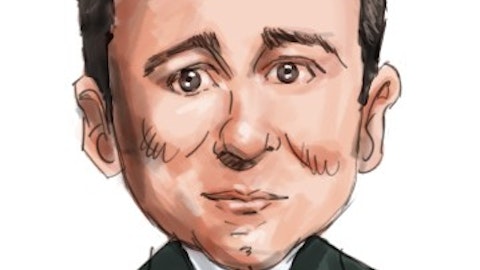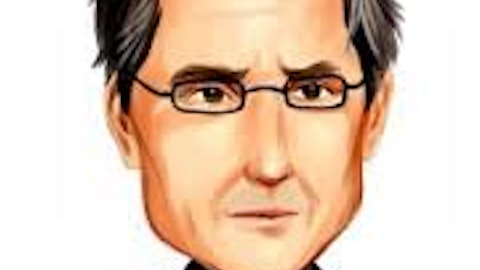Our database of 13F filings allows us to see how many hedge funds and other notable investors that we track own a particular stock, which in turn allows us to see which stocks are becoming more or less popular with the hedge fund community over time. The fact that a number of hedge funds are selling out of a stock isn’t necessarily a bearish signal, but it’s something that might be good for investors to keep in mind before placing a trade. Here are four large-cap stocks that a substantial number of hedge funds sold out of during the third quarter of 2012:
Union Pacific Corporation (NYSE:UNP), a $58 billion market cap railroad, had its hedge fund ownership fall from 45 funds at the beginning of July to 37 funds at the end of September. Billionaire Glenn Dubin’s Highbridge Capital Management was one of the funds leaving the stock (see what else Highbridge was trading during the third quarter). It’s possible that these funds were generally bearish on the U.S. economy, and didn’t want to be exposed to a company whose services depend on overall economic activity. Other than that Union Pacific actually doesn’t look like that bad an investment: it carries trailing and forward P/Es of 15 and 13, respectively, and at least in its most recent quarter reported a double-digit growth rate of earnings relative to the third quarter of 2011. Smaller railroads such as CSX Corporation (NYSE:CSX) and Norfolk Southern Corp. (NYSE:NSC), however, do trade at a discount to Union Pacific in terms of their earnings.
Billionaire Ken Griffin’s Citadel Investment Group was one of the hedge funds which sold out of its PepsiCo, Inc. (NYSE:PEP) position during the third quarter. Pepsi had been one of Citadel’s largest holdings at the beginning of July, so it’s notable to see the fund sell. Read more coverage of Citadel’s investment activity and review the positions the fund reported in its 13F filing. Pepsi’s revenue and earnings were down about 5% in the third quarter compared to the same period last year, while rival The Coca-Cola Company (NYSE:KO) had actually grown its business. With Pepsi trading at a very small discount to the market leader (Pepsi’s trailing P/E multiple is 19, while Coca-Cola’s is 20), we can see why hedge funds would be avoiding it.
UnitedHealth Group Inc. (NYSE:UNH) joined the Dow Jones Industrial Average in September, but over the course of the quarter hedge funds apparently believed that the health insurer was no longer a good investment. 50 filers in our database reported owning the stock, down from 58 three months earlier, and the stock barely made our list of the ten healthcare stocks hedge funds love. Billionaire David Einhorn’s Greenlight Capital was one of the funds that abandoned UnitedHealth in Q3 (check out David Einhorn’s stock picks). In terms of its recent performance and current valuation, UnitedHealth looks cheap at 10 times trailing earnings and decent earnings growth rates; we’d have to wonder if hedge funds are worrying about political and regulatory risk.
The 32 funds which had been invested in AT&T Inc. (NYSE:T) at the end of the second quarter of 2012 became 25 three months later. Stanley Druckenmiller was one of the investors in our database who sold out of the stock, though other funds such as billionaire David Shaw’s D.E. Shaw increased their positions (see more stocks that D.E. Shaw was buying). While AT&T pays a high dividend yield and has limited exposure to the broader indices, it is very dependent on seeing better earnings numbers next year. In addition, the company’s revenue and earnings have been about flat over the last year. Verizon Communications Inc. (NYSE:VZ), in contrast, grew its earnings 16% in the third quarter versus Q3 2011 and has a similar beta and dividend yield to AT&T.






